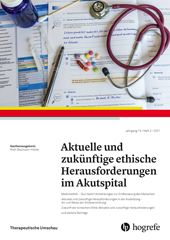Aktuelle und zukünftige Herausforderungen in Behandlung und Betreuung von psychisch kranken Menschen im Akutspital und die Rolle der Ethik
Abstract
Zusammenfassung. Psychisch Kranke sind in verstärktem Masse gefährdet auch körperlich zu erkranken. Umgekehrt können Krankheiten mit lebensbedrohlichem Charakter zu psychischen Krisen und Erkrankungen führen. Im Akutspital werden körperliche und psychische Komorbiditäten und ihre möglichen Folgen auf Behandlungsverlauf und –entscheide häufig nicht diagnostiziert und angemessen behandelt. Auch im Bereich der Psychoonkologie und dem noch jungen Gebiet der Psychokardiologie stellt sich die Frage, ob alle Patientinnen und Patienten entsprechend erfasst und ihre Bedürfnisse nach psychologischer Unterstützung und Behandlung ausreichend erkannt sind. Eine besondere Herausforderung im klinischen Alltag und speziell auf der Intensivstation stellt die Einschätzung der Urteils- und Einwilligungsfähigkeit dar. Diese anspruchsvolle Aufgabe kann nicht im professionellen Alleingang erfolgen, sondern erfordert einen interdisziplinären Zugang. Es ist Aufgabe der Ethik für die Gewährleistung einer ausreichenden Diagnostik und angemessenen Behandlung psychisch Kranker im Akutspital einzustehen und die Interdisziplinarität – für psychisch Kranke häufig in der Person des Konsiliarpsychiaters – einzufordern. Für Behandlungsentscheide gelten aus juristischer und ethischer Sicht die Gleichbehandlung aller Patientinnen und Patienten und das Diskriminierungsverbot. Unabhängig von einer körperlichen oder psychischen Erkrankung bedarf jede therapeutische Massnahme der Zustimmung des Patienten. Orientierend am Prinzip der Selbstbestimmung ist es Rolle der Ethik für eine patientengerechte Entscheidungsfindung bei psychisch Kranken zu sensibilisieren. Behandlungsentscheide entstehen hier häufig als Ergebnis therapeutischer Prozesse, die zugleich die Befähigung zur Einwilligung anstreben und zeitintensiv sind. Situationen beeinträchtigter Urteils-und Entscheidungsfähigkeit und Erfahrungen der Abhängigkeit weisen auf die grundsätzliche Sorgebedürftigkeit des Menschen hin. Nur eingebettet in einer Kultur der Sorge als Grundlage ärztlichen und pflegerischen Handelns kann eine Haltung des Respekts gegenüber psychisch Kranken und ihrer (beeinträchtigten) Selbstbestimmung zum Tragen kommen. Als Ausdruck dieser Kultur ist zu wünschen, dass „die Sprache der Sorge“ wiedererlernt, eingeübt und dauerhaft angewendet wird.
Abstract. The mentally ill are at a high risk of also becoming physically ill. Vice versa, life-threatening physical illnesses may precipitate mental crises and illnesses. The emergency ward of a hospital often fails to diagnose and / or treat concomitant mental and physical disorders and their sequelae during admission. Psycho-oncology and the more recent field of psycho-cardiology deal with the question of whether patients are being properly diagnosed and their need for psychological support and care is being adequately met. One particular challenge in everyday clinical practice (especially in the intensive care unit) lies in assessing a patient’s power of judgment and consent. This demanding task should not take place unilaterally, but rather should be treated interdisciplinarily. Only professional medical ethics can guarantee the sufficient diagnostic and appropriate treatment of the mentally ill in the emergency ward. It is thus of utmost importance that interdisciplinarity, generally in the form of a psychiatric consultancy, be ensured. Decisions about treatment must be made in light of the legal and ethical standards guaranteeing the equal treatment of all patients and the absence of discrimination. Regardless of the physical and mental malady, every therapeutic measure demands the patient’s consent. Based on the principle of self-determination, medical ethics has the role of ensuring that decisions made in the treatment of the mentally ill conform to these standards. Often such treatment decisions result from therapeutic processes that promote a patient’s power of consent and are very time-consuming. Situations in which a patient’s power of judgment and consent is limited, or in which they are dependent on others, reflect the basic need every human has to be cared for. Respect toward the mentally ill and their (impaired) self-determination can arise only when it is embedded in an overall culture of caring as the basis for all medical and nursing behavior. This culture is manifested in the so-called “language of care,” which must be learned, practiced, and exercised on a long-term basis.



